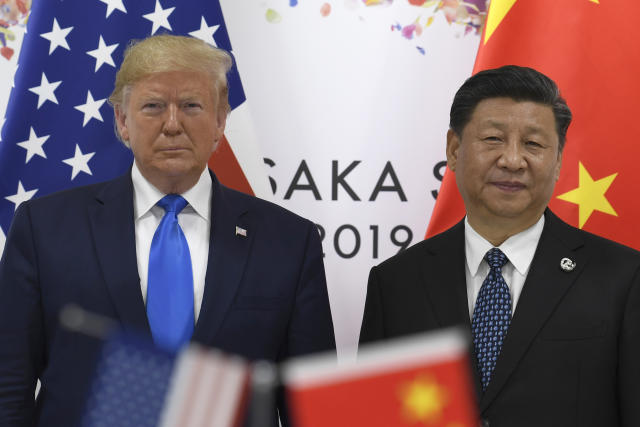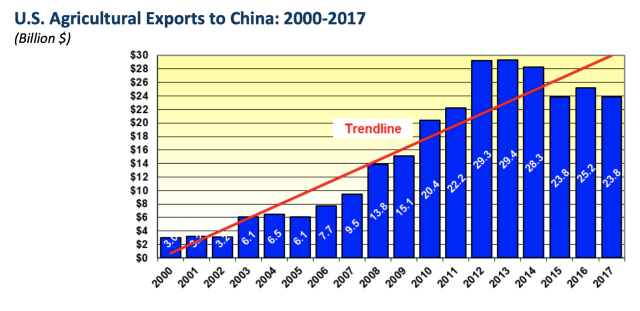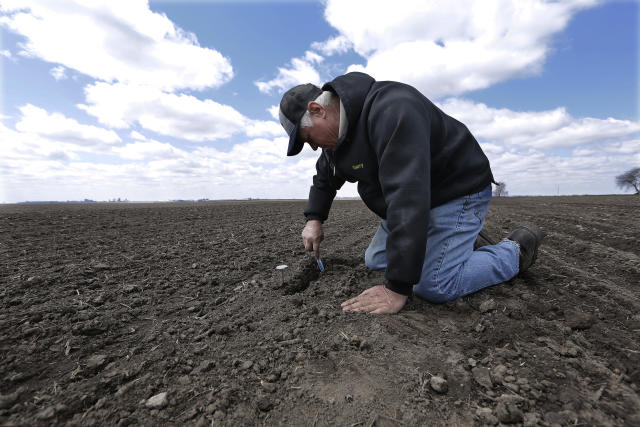| U.S. farmers: 'Another nail in the coffin' |
| 送交者: 2019年08月06日02:14:02 于 [世界军事论坛] 发送悄悄话 |
|
|
U.S. farmers are exasperated by latest trade war moves: 'Another nail in the coffin'Trade tensions between the U.S. and China are flaring once again, and American farmers continue to bear the brunt of the implications. In response to President Trump recently announcing 10% tariffs on $300 billion in Chinese goods, China allowed the yuan to weaken and suspended purchases U.S. agricultural products. “The Chinese market has a large capacity and the prospect of importing high-quality U.S. agricultural products is bright," state-owned media Xinhua said on Monday. "However, we hope the U.S. will conscientiously implement the consensus reached at the [G-20 summit in Osaka, Japan] between the heads of the two countries, and implement the commitments to create the necessary conditions for cooperation in the agricultural fields between the two countries.” America farmers were dismayed by the developments. “This is just another nail in the coffin,” Tyler Stafslien, a North Dakota-based soybean farmer, told Yahoo Finance. “To see this thing only seems to be getting worse rather than better is very concerning, and the American taxpayers may have to foot another round of funding if this keeps up — or we could see a ton of farmers’ loss throughout this nation.” American Farm Bureau Federation President Zippy Duvall said that the pain extended across the country. “China’s announcement that it will not buy any agricultural products from the United States is a body blow to thousands of farmers and ranchers who are already struggling to get by,” Duvall stated.  ‘Tariff policies have been doing financial harm to farmers’Although farmers have collectively been receiving billions in market facilitation payments from the USDA, Stafslien sees these payments as “band-aids.” The Trump administration announced in July that it would be providing an additional $16 billion in aid to farmers affected by the trade war. “It’s certainly proof that the administration recognizes their tariff policies have been doing financial harm to farmers and rural America,” Stafslien said. Michelle Ziesch, a North Dakota farmer who grows beef cattle, corn, soybeans, and other crops, said she was “very disappointed” by the latest development. “We were hoping that by now, the trade talks would be continuing and hopefully making some progress,” she told Yahoo Finance. “So that’s a pretty big setback.” Back in May 2019, U.S soybean prices reached its lowest level in a decade, dipping below $8 a bushel for the first time since 2008. But for farmers to make some kind of profit, they have still sold their crops despite the record-low prices. “At some point, you have to sell, because we need some cash flow and when you’re selling at a loss, it’s just an ugly situation to be in,” Ziesch said. “If the price of soybeans is low because of tariffs, there’s not much I can do about it at some point,” Stafslien said. “You have to have cash flow just like any business. You may be selling at a loss just to rob Peter to pay Paul.” ‘We had developed a market with China’ Over the last year, as a means to finding a new source for soybeans, China has turned to countries like Argentina and Brazil. This has left American soybean farmers in the dust, so to speak. The S&P Global reported that Argentine and Brazilian soybean exports are projected to increase over the next marketing year, while U.S. sales are expected to fall. Stafslien expressed his frustration at the inability for the two countries to reach a deal, particularly with the Trump administration, and the lost markets. “As farmers, we had developed a market with China,” he said. “We need trading partners. It’s simple supply and demand. I’m very frustrated with our administration because despite the fact China is known to play dirty, specifically with intellectual property theft and such, that’s really, unfortunately, not my concern.”  Stafslien added this his concern “is feeding my kids. And I think there were methods to deal with China other than this brute force tactic that doesn’t seem to be working.” Bob Kuylen, a wheat farmer, expressed a similar sentiment, recently telling Yahoo Finance: “This trade thing is what’s brought on by the president, and it’s really frustrating because he took away all of our markets.” “All these countries went to different countries to get their grain,” he added. “How are we going to get the relations back with them to buy our grain again and be our customers?” The tit-for-tat tariffs have been going on between the U.S. and China since the trade war commenced in 2018. As a result, Beijing essentially stopped importing U.S. soybeans in 2018 (imports were down 98% at one point). Bloomberg reported in April 2019 that farm incomes fell by the most in three years, largely tied to the trade war. Although Ziesch is frustrated by all of these challenges, her feelings are tied more to a lack of understanding from the general public rather than the political climate. “It’s just the feeling of being under-appreciated and maybe misunderstood [about] the work that goes into farming and raising food for the world, that we’re just a blip on the map because we’re only 2% of the population,” she said. ‘My reaction is fear’ For Stafslien and Ziesch, this is just another step backwards. “My reaction is fear, frankly. Fear for the future,” Stafslien said. “We keep hearing from this administration that they’re working toward a trade deal with China, and then it seems like the facts don’t support what we’re being told. To have this disruption in the markets ... then to see this thing continue to escalate and essentially go backwards for us is very, very concerning.” Ziesch stressed how tough it has been to market her products. “We’re going backwards on about every crop we’ve put in,” she said. “It’s just how far?” Adriana is an associate editor for Yahoo Finance. Follow her on Twitter @adrianambells. |
|
|
|
|
 |
 |
| 实用资讯 | |
|
|
| 一周点击热帖 | 更多>> |
|
|
|
| 一周回复热帖 |
|
|
| 历史上的今天:回复热帖 |
| 2018: | 战争到来前,将办公室将军淘汰! | |
| 2018: | 川普贸易战告败,令美国一病不起!川普 | |
| 2017: | 中印对歧,在于谁能让对方下更大赌注 | |
| 2017: | 中国研制成功新型反炮兵雷达性能超过美 | |
| 2016: | 中国首个手机通信卫星天通一号01星成功 | |
| 2016: | 港獨打正旗號集會 人代:破壞十分大 | |
| 2015: | 赢了!世锦赛男子100米自由泳宁泽涛47秒 | |
| 2015: | 外媒:TPP谈判无果而终将重创日本对华战 | |
| 2014: | 关于西方欺侮俄罗斯,正确的态度是坐山 | |
| 2014: | 中国不认双重国籍 | |
|
|


